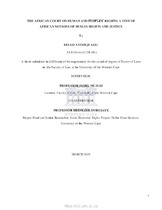| dc.description.abstract | The African Court on Human and Peoples’ Right (the Court) is the most recent of the three regional Human Rights Bodies. Envisioned by the African Charter on Human and Peoples’ Right, its structures was not planned until the Organisation of African Unity (OAU) promulgated a protocol for its creation in 1998.
The Court complements the protective mandate of the African Commission on Human and Peoples’ Rights (‘The Commission’) and the Court has the competence to take final and binding decisions on human rights violations. Unlike its European and inter-American versions where their courts are integral parts of the cardinal instrument of the system ab initio, the establishment of the African Court was merely an afterthought.
At the initial, protection of rights rested solely with the Commission upon African justice system which emphasises reconciliation as it is non-confrontational method of settlements of. The Commission is a quasi-judicial body modelled after the United Nations Human Right Committee without binding powers and with only limited functions covering examination of State reports, communications alleging violations and interpreting the Charter at the request of a State, the OAU or any organisation recognised by the OAU.
The thesis answers the question whether the adoption of the African Court means that the African model of enforcing human rights has failed or whether having the Court constitute a concession to the triumph of the western model of law enforcement.
The imperative of the 30th Ordinary Session of the OAU in 1994 where the creation of an African
Court of Human and Peoples’ Rights was viewed as the best way of protecting human rights across the region would be treated. The relevance of such an examination is highlighted by the fact that the African Charter did not make any provision for the establishment of a Court to enforce the rights guaranteed thereunder. If we are to assume that justice by reconciliation has failed and should be replaced by or complimented with justice by adjudication as the primary means of conflict resolution, what guarantees are there that the latter form of justice will not also fail?
This thesis therefore will critically evaluate the African Court on Human and Peoples’ Rights and assessed its potential impact on the African human rights system. It will also probe the power of the Court and see whether a clear and mutually reinforcing division of labour between it and the African Commission can be developed to promote and protect human rights on the continent.
This research brings to focus an area that requires attention if the African human rights regime is to be effective. It put to test the criticism against the African Charter and the Protocol to the African Charter on the Establishment of an African Court on Human and Peoples’ Rights and also identified the present existing flaws in the African regional system. Furthermore, it ascertained whether or not, given the availability of other options, a regional Court is, in fact, the ideal mechanism for the protection of human rights in Africa. | en_US |

